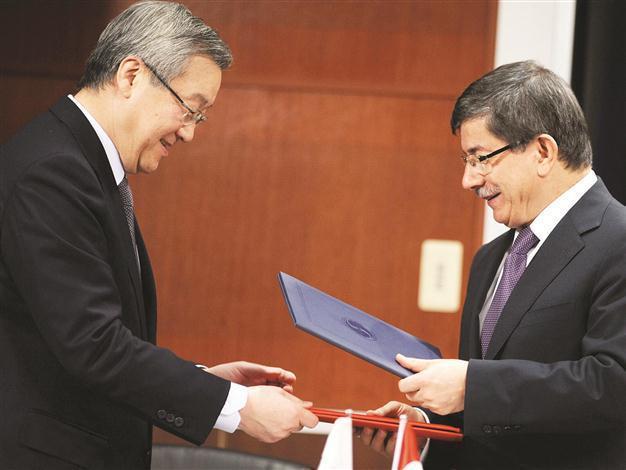Ankara looks for no Iranian oil options
ANKARA / PARIS

Turkey and South Korea agree to sign a free trade deal, which will pave the way to balancing trade, Davutoğlu says after talks with his South Korean counterpart Kim. p.10 DAILY NEWS photo, Selahattin SÖNMEZ
Turkey is working on a plan to avert the political and economic difficulties it could face as a result of the Washington-proposed sanctions against Iranian crude oil exports, which make up nearly one third of the country’s daily consumption. Though Turkish officials voiced their intention to seek exemption from sanctions, (as they would only abide by U.N. Security Council resolutions), the government is weighing various ways to gradually reduce Iranian oil imports, including by using Saudi Arabia and Russia as potential alternative suppliers.The United States imposed a fresh round of sanctions against financial institutions dealing with the Iranian Central Bank late December, aimed at hampering Iran’s crude oil exports to international markets. The U.S. is threatening to impose sanctions on the financial institutions of other countries if they “engage in a financial transaction for the sale or purchase of petroleum or petroleum products to or from Iran after 180 days of the enactment of the law,” signed by President Barack Obama on Dec. 31, 2011.
In official remarks, Turkey has openly said it would only implement sanctions if they were imposed by the U.N. Security Council but also added it would consider seeking an exemption from measures against Iran given its unique position. However, despite whether Turkey abides, the law will have a direct effect on Turkish financial institutions as a result of the country’s nearly 9 million tons of crude oil purchases from Iran. The country’s sole refiner, Tüpraş, renewed the deal to buy the same amount of oil from Iran in 2012, but Reuters reported that it was planning to meet Saudi Arabian oil authorities this month in order to secure an alternative supply. Tüpraş did not comment on the story late Friday.
Ankara undertakes delicate work
Within this framework, a working group consisting of technocrats from the ministries of Foreign Affairs, Energy and Trade, as well the Treasury and other related institutions has begun working on how Turkey should respond to Washington’s sanctions on Iran. For Ankara, the situation is a very complicated one, with multiple economic and political dimensions, as Turkey has special relations with both Iran and the U.S.
The worst scenario for Turkey and obviously for the entire world is the closure of the Strait of Hormuz, which would not only destabilize political balances but also damage global economic and energy markets. This scenario would see oil and gas prices skyrocket and cause energy shortages worldwide.
[HH] Two ways to escape sanctions
Turkey has two ways to protect its financial institutions from being imposed with sanctions by the United States. Sanctions will not be imposed on the financial institutions of a country if it significantly reduces the volume of crude oil purchased from Iran in the designated time frame, or if the price and supply of petroleum and petroleum products in countries other than Iran is sufficient. Obama is set to submit reports every 180 days to analyze the global situation.
The second way is to get a waiver from the U.S. administration, under certain conditions, for a limited time of not more than 120 days. Even if Turkey could get a waiver it would only be valid for two terms of 120 days, as described by the law.
Under these conditions, Turkey has not officially demanded a waiver from the U.S., as sources expect this will be one of the top issues during Foreign Minister Ahmet Davutoğlu’s trip to Washington in the first half of February.
Turkey, Iran sign economic deal
Amid ongoing discussions over sanctions against Iran, Ankara and Tehran signed a deal late Thursday to increase their trade volume to $30 billion by 2015. Apart from commitments to further deepen cooperation in the field of energy, Urban Planning and Environment Minister Erdoğan Bayraktar said the two countries were working on improving cooperation in the banking system. “Work is underway for Turkey to enter the Iranian banking system and for Iran to enter the Turkish banking system. We plan very important steps on money transfer,” he said, without giving details.
However, cooperation with Iran on the banking system seems to be unlikely, as Turkish financial institutions have been directly warned that engaging in such transactions from or to Iran will put their business with the American companies in danger.
















